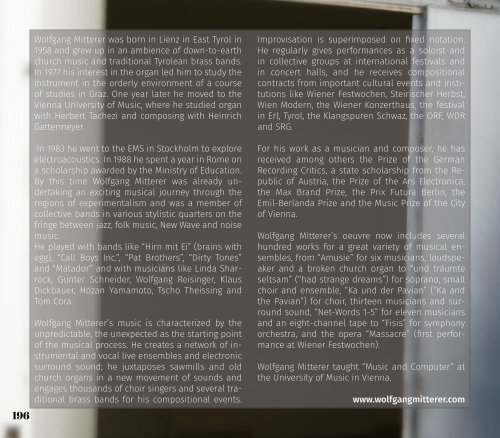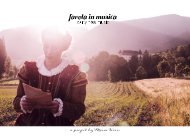Booklet "favola in musica.alte neue musik"
Enjoy the 216 pages fairy tale book inspired booklet of "favola in musica. early new music" in German and English with over 100 photographs, well researched musical texts to each aria, translations of all aria texts in German and English and biographies of all participating members. Music from renaissance, baroque and present time - 3 world premiere recordings from early music (Antonio Caldara, Sebastian Durón) - 2 world premiere recordings of contemporary music (Wolfgang Mitterer) - 1 bonus music-video (included on the CD) Deluxe Edition in a high-quality CD-Hardcover-Digibook, 216 costly designed pages with photos and texts 1607. ensemble for early & new music: Maria Weiss, voice, artistic director Rosario Conte, theorbo Gyöngy Erödi, cello Wolfgang Mitterer, composer Awarded the Pasticciopreis 2015 in Radio Österreich 1 »favola in musica« (eng. fairy tale in music) is the debut-album of the mezzo-soprano Maria Weiss, who designed this album as a musical fairy taie. It is the searching for the New within the Old and for the Old within the New. Developing this album,Maria Weiss lifted some treasures to light, so e.g. she discovered in the archives an aria of the forgotten opera of the composer Antonio Caldara. She also asked the composer and performer Wolfgang Mitterer, to reate two new works for this album. If you engage into this musical journey, you can also find the words of Monteverdis L'Orfeo but in an competely new contemporary way. Enjoy!
Enjoy the 216 pages fairy tale book inspired booklet of "favola in musica. early new music" in German and English with over 100 photographs, well researched musical texts to each aria, translations of all aria texts in German and English and biographies of all participating members.
Music from renaissance, baroque and present time
- 3 world premiere recordings from early music (Antonio Caldara, Sebastian Durón)
- 2 world premiere recordings of contemporary music (Wolfgang Mitterer)
- 1 bonus music-video (included on the CD)
Deluxe Edition in a high-quality CD-Hardcover-Digibook, 216 costly designed pages with photos and texts
1607. ensemble for early & new music:
Maria Weiss, voice, artistic director
Rosario Conte, theorbo
Gyöngy Erödi, cello
Wolfgang Mitterer, composer
Awarded the Pasticciopreis 2015 in Radio Österreich 1
»favola in musica« (eng. fairy tale in music) is the debut-album of the mezzo-soprano Maria Weiss, who designed this album as a musical fairy taie. It is the searching for the New within the Old and for the Old within the New. Developing this album,Maria Weiss lifted some treasures to light, so e.g. she discovered in the archives an aria of the forgotten opera of the composer Antonio Caldara. She also asked the composer and performer Wolfgang Mitterer, to reate two new works for this album. If you engage into this musical journey, you can also find the words of Monteverdis L'Orfeo but in an competely new contemporary way. Enjoy!
Sie wollen auch ein ePaper? Erhöhen Sie die Reichweite Ihrer Titel.
YUMPU macht aus Druck-PDFs automatisch weboptimierte ePaper, die Google liebt.
Wolfgang Mitterer was born <strong>in</strong> Lienz <strong>in</strong> East Tyrol <strong>in</strong><br />
1958 and grew up <strong>in</strong> an ambience of down-to-earth<br />
church music and traditional Tyrolean brass bands.<br />
In 1977 his <strong>in</strong>terest <strong>in</strong> the organ led him to study the<br />
<strong>in</strong>strument <strong>in</strong> the orderly environment of a course<br />
of studies <strong>in</strong> Graz. One year later he moved to the<br />
Vienna University of Music, where he studied organ<br />
with Herbert Tachezi and compos<strong>in</strong>g with He<strong>in</strong>rich<br />
Gattermeyer.<br />
In 1983 he went to the EMS <strong>in</strong> Stockholm to explore<br />
electroacoustics. In 1988 he spent a year <strong>in</strong> Rome on<br />
a scholarship awarded by the M<strong>in</strong>istry of Education.<br />
By this time Wolfgang Mitterer was already undertak<strong>in</strong>g<br />
an excit<strong>in</strong>g <strong>musica</strong>l journey through the<br />
regions of experimentalism and was a member of<br />
collective bands <strong>in</strong> various stylistic quarters on the<br />
fr<strong>in</strong>ge between jazz, folk music, New Wave and noise<br />
music.<br />
He played with bands like “Hirn mit Ei” (bra<strong>in</strong>s with<br />
egg), “Call Boys Inc.”, “Pat Brothers”, “Dirty Tones”<br />
and “Matador” and with musicians like L<strong>in</strong>da Sharrock,<br />
Gunter Schneider, Wolfgang Reis<strong>in</strong>ger, Klaus<br />
Dickbauer, Hozan Yamamoto, Tscho Theiss<strong>in</strong>g and<br />
Tom Cora.<br />
Wolfgang Mitterer’s music is characterized by the<br />
unpredictable, the unexpected as the start<strong>in</strong>g po<strong>in</strong>t<br />
of the <strong>musica</strong>l process. He creates a network of <strong>in</strong>strumental<br />
and vocal live ensembles and electronic<br />
surround sound; he juxtaposes sawmills and old<br />
church organs <strong>in</strong> a new movement of sounds and<br />
engages thousands of choir s<strong>in</strong>gers and several traditional<br />
brass bands for his compositional events.<br />
196<br />
Improvisation is superimposed on fixed notation.<br />
He regularly gives performances as a soloist and<br />
<strong>in</strong> collective groups at <strong>in</strong>ternational festivals and<br />
<strong>in</strong> concert halls, and he receives compositional<br />
contracts from important cultural events and <strong>in</strong>stitutions<br />
like Wiener Festwochen, Steirischer Herbst,<br />
Wien Modern, the Wiener Konzerthaus, the festival<br />
<strong>in</strong> Erl, Tyrol, the Klangspuren Schwaz, the ORF, WDR<br />
and SRG.<br />
For his work as a musician and composer, he has<br />
received among others the Prize of the German<br />
Record<strong>in</strong>g Critics, a state scholarship from the Republic<br />
of Austria, the Prize of the Ars Electronica,<br />
the Max Brand Prize, the Prix Futura Berl<strong>in</strong>, the<br />
Emil-Berlanda Prize and the Music Prize of the City<br />
of Vienna.<br />
Wolfgang Mitterer’s oeuvre now <strong>in</strong>cludes several<br />
hundred works for a great variety of <strong>musica</strong>l ensembles,<br />
from “Amusie” for six musicians, loudspeaker<br />
and a broken church organ to “und träumte<br />
seltsam” (“had strange dreams”) for soprano, small<br />
choir and ensemble, “Ka und der Pavian” (“Ka and<br />
the Pavian”) for choir, thirteen musicians and surround<br />
sound, “Net-Words 1-5” for eleven musicians<br />
and an eight-channel tape to “Fisis” for symphony<br />
orchestra, and the opera “Massacre” (first performance<br />
at Wiener Festwochen).<br />
Wolfgang Mitterer taught “Music and Computer” at<br />
the University of Music <strong>in</strong> Vienna.<br />
www.wolfgangmitterer.com





